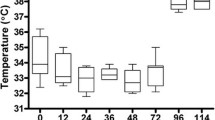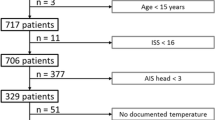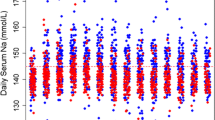Abstract
Introduction: We evaluated the effect of induced hypothermia on biochemical parameters in patients with severe traumatic brain injury.
Methods: We obtained hemoglobin, hematocrit, white blood count, lymphocyte count, platelet count, and serum concentrations of sodium, potassium, glucose, albumin, and C-reactive protein, and prothrombin time, hepaplastin test, activated partial thromboplastin time, antithrombin-III, α2PI, and nitrogen excretion on the day of admission, and on days 1, 3, 5, 7, 14, and 21 after the injury in 31 patients with severe head injury who were treated with hypothermia of 33°ranging from 48 to 72 hours. We selected 33 normothermic patients as a control group; these patients were selected from patients who had been treated before hypothermia was used as a treatment modality, by the same criteria for hypothermia therapy. We compared the biochemical markers and rectal temperature and intracranial pressure in the hypothermia group with those in the normothermia group. Outcome was assessed using the Glasgow Outcome Scale at 6 months after injury.
Results: The demographic characteristics, severity, and outcome were similar in the hypothermia and normothermia group. Intracranial pressure was significantly decreased by hypothermia. Serum potassium concentration decreased significantly during hypothermia. White blood cell counts and C-reactive protein levels were higher after rewarming in the hypothermia group, and these were also higher in the patients with infectious complications, although the incidence of infectious complications did not differ between the hypothermia and normothermia groups. There were no statistically significant prolongations of activated partial thromboplastin time and no decline in prothrombin time with hypothermia. Platelet count, antithrombin-III, and α2PI did not differ significantly between the two groups.
Conclusion: Hypothermia of 33° for 48–72 hours does not appear to increase the risk for coagulopathy and infections, although hypothermic patients exhibited significant increments in inflammatory markers such as C-reactive protein and white blood counts after rewarming.
Similar content being viewed by others
References
Miller JD, Becker DP, Ward JD, Sullivan HG, Adams WE, Rosner MJ. Significance of intracranial hypertension in severe head injury. J Neurosurg 1977;47:503–516.
Marmarou A, Anderson PL, Ward JD, Choi SC, Young HF. Impact of ICP instability and hypotension on outcome in patients with severe head trauma. J Neurosurg 1991;(Suppl)75:59–66.
Ghajar J, Hariri RJ, Patterson RH. Improved outcome from traumatic coma using only ventricular cerebrospinal fluid drainage for intracranial pressure control. Adv Neurosurg 1993;21:173–177.
Shiozaki T, Sugimoto H, Taneda M, et al. Effect of mild hypothermia on uncontrollable intracranial hypertension after severe head injury. J Neurosurg 1993;79:363–368.
Marion DW, Penrod LE, Kelsey SF, et al. Treatment of traumatic brain injury with moderate hypothermia. N Engl J Med 1997;336:540–546.
Shiozaki T, Sugimoto H, Taneda M, et al. Selection of severely head injured patients for mild hypothermia therapy. J Neurosurg 1998;89:206–211.
Clifton GL, Miller ER, Choi SC, et al. Lack of effect of induction of hypothermia after acute brain injury. N Engl J Med 2001;344:556–563.
Clifton GL, Choi SC, Miller ER, et al. Intercenter variance in clinical trials of head trauma-experience of the National Acute Brain Injury Study: Hypothermia. J Neurosurg 2001;95:751–755.
Tokutomi T, Morimoto K, Miyagi T, Yamaguchi S, Ishikawa K, Shigemori M. Optimal temperature for the management of severe traumatic brain injury: effect of hypothermia on intracranial pressure, systemic and intracranial hemodynamics, and metabolism. Neurosurgery 2003;52:102–112.
Gadisseux P, Ward JD. Nutritional support of head-injured patients. In: The text book of head injury. (Becher DP, Gudeman SK, ed.) Saunders, Philadelphia, 1989.
Shiozaki T, Hayakata T, Taneda M, Nakajima Y, Hashiguchi N, Fujimi S, et al. A multicenter prospective randomized controlled trail of the efficacy of mild hypothermia for severely head injured patients with low intracranial pressure. J Neurosurg 2001;94:50–54.
Goss JR, Styren SD, Miller PD, et al. Hypothermia attenuates the normal increase in interleukin 1 beta RNA and nerve growth factor following traumatic brain injury in the rat. J Neurotrauma 1995;12:159–167.
Whalen MJ, Carlos TM, Clark RSB, et al. The effect of brain temperature on acute inflammation after traumatic brain injury in rats. J Neurotrauma 1997;14:561–572.
Chatzipanteli K, Alonso OF, Kraydieh S, Dietrich D. Importance of posttraumatic hypothermia and hyperthermia on the inflammatory response after fluid percussion brain injury: biochemical and immunocytochemical studies. J Cereb Blood Flow Metab 2000;20:531–542.
Kawai N, Kawanishi M, Okauchi M, Nagao S. Effects of hypothermia on thrombin-induced brain edema formation. Brain Res 2001;895:50–58.
Aibiki M, Maekawa S, Ogura S, Kinoshita Y, Kawai N, Yokono S. Effect of moderate hypothermia on systemic and internal jugular plasma IL-6 levels after traumatic brain injury in humans. J Neurotrauma 1999;16:225–232.
Miller PR, Munn DD, Meredith JW, Chang MC. Systemic inflammatory response syndrome in the trauma intensive care unit: Who is infected? J Trauma 1999;47:1004–1008.
Reny JL, Vuagnat A, Ract C, Benoit MO, Safar M, Fagon JY. Diagnosis and follow-up of infections in intensive care patients: Value of C-reactive protein compared with other clinical and biological variables. Crit Care Med 2002;30:529–535.
Lobo SMA, Lobo FRM, Bota DP, et al. C-reactive protein levels correlate with mortality and organ failure in critically ill patients. Chest 2003;123:2043–2049.
Valeri CR, Feingold H, Cassidy G, Rando G, Khuri S, Altschule MD. Hypothermia-induced reversible platelet dysfunction. Ann Surg 1987;205:175–181.
Krause KR, Howells GA, Buhs CL, Hernandez DA, Bair H, Schuster M, et al. Hypothermia-induced coagulopathy during hemorrhagic shock. Am Surg 2000;66:348–354.
Boldt J, Knothe C, Zickmann B, Bill S, Dapper F, Hempelmann G. Platelet function in cardiac surgery: influence of temperature and aprotinin. Ann Thorac Surg 1993;55:652–658.
Resnick DK, Marion DW, Darby JM. The effect of hypothermia on the incidence of delayed traumatic intracerebral hemorrhage. Neurosurgery 1994;34:252–256.
Olson JD, Kaufman HH, Moake J, O’Gorman TW, Hoots K, Wagner K, et al. The incidence and significance of hemostatic abnormalities in patients with head injuries. Neurosurgery 1989;24:825–832.
Reed RL, Johnston TD, Hudson JD, Fischer RP. The disparity between hypothermic coagulopathy and clotting studies. J Trauma 1992;33:465–470.
Gubler KD, Gentilello LM, Hassantash SA, Maier RV. The impact of hypothermia on dilutional coagulopathy. J Trauma 1994;36:847–851.
Johnston TD, Chen Y, Reed RL. Functional equivalence of hypothermia to specific clotting factor deficiencies. J Trauma 1994;37:413–417.
Schubert A. Side effects of mild hypothermia. J Neurosurg Anesthesiol 1995;7:139–147.
Marion DW, Leonov Y, Ginsberg M, Katz, LM, Kochanek PM, Lechleuthner A, et al. Resuscitative hypothermia. Crit Care Med 1996;24:S81-S89.
Boelhouwer RU, Bruining HA, Ong GL. Correlations of serum potassium fluctuations with body temperature after major surgery. Crit Care Med 1987;15:310–312.
Sprung J, Cheng EY, Gamulin S, Kampine JP, Bosnjak ZJ. Effects of acute hypothermia and β-adrenergic receptor blockade on serum potassium concentration in rats. Crit Care Med 1991;19:1545–1551.
Sprung J, Cheng S, Gamulin JP, Kampine JP, Bosnjak ZJ. The effect of acute hypothermia and serum potassium concentration on potassium cardiotoxicity in anesthetized rats. Acta Anaesthesiol Scand 1992;36:825–830.
Polderman KH, Peerdeman SM, Girbes ARJ. Hypophosphatemia and hypomagnesemia induced by cooling in patients with severe head injury. J Neurosurg 2001;94:697–705.
Tveita T, Ytrehus K, Myhre ESP, Hevroy O. Left ventricular dysfunction following re-warming from experimental hypothermia. J Appl Physiol 1998;85:2135–2139.
Author information
Authors and Affiliations
Corresponding author
Rights and permissions
About this article
Cite this article
Tokutomi, T., Miyagi, T., Morimoto, K. et al. Effect of hypothermia on serum electrolyte, inflammation, coagulation, and nutritional parameters in patients with severe traumatic brain injury. Neurocrit Care 1, 171–182 (2004). https://doi.org/10.1385/NCC:1:2:171
Issue Date:
DOI: https://doi.org/10.1385/NCC:1:2:171




